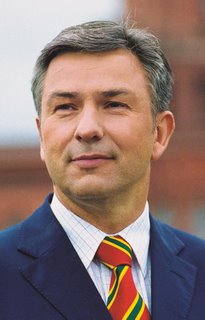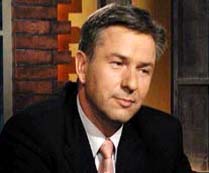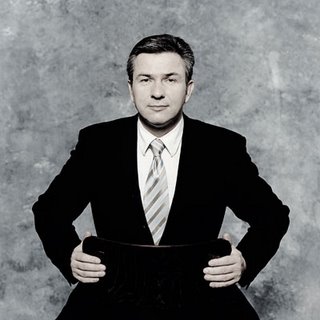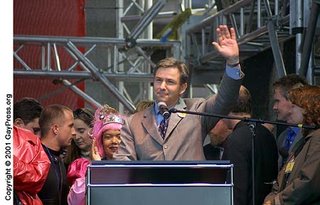By BENJAMIN WEINTHAL
The most popular politician in Berlin is gay. Will he continue to make political history by winning a second term as mayor on September 17? The nation’s first openly gay big city mayor, Klaus Wowereit is running an energetic re-election campaign in the city restored to its traditional role as capital in the wake of Germany’s reunification.

Berlin, of course, is also a city with a lively queer culture.
Wowereit (pronounced vovv-er-ite) catapulted himself into political and gay cultural stardom with his eloquently succinct statement outing himself in 2001. “Ich bin schwul und das ist auch gut so”—”I am gay and that’s okay,” declared Wowereit in a televised speech. Scuttlebutt had it that the tabloid media were prepared to exploit the to-date undisclosed sexual orientation of the Social Democratic Party’s mayoral standard-bearer in an effort to sabotage his expected victory.
Wowereit inoculated himself against the attack with his courageous pre-emptive announcement.
Martin Reichert, a journalist who frequently reports about queer themes for the liberal-progressive daily German newspaper die taz, commented on the historic nature of the announcement.
“Since Wowereit’s ‘I am gay and that’s okay,’ it’s nothing like it once was,” Reichart said. “It was the final breakthrough for gays and lesbians in Germany”.
The sentence has been copyrighted and aptly captures Wowereit’s efforts since becoming mayor to further the transformation of Berlin, a city of 3.4 million residents, into a tolerant, multi-cultural, cosmopolitan world city on par with London, Paris, and New York.
Wowereit’s Social Democratic Party (SPD) is a left of center party, roughly comparable to the wing of the Democratic Party that encompasses Jesse Jackson and Wisconsin Senator Russ Feingold. As mayor, he leads a coalition municipal government made up of the SPD and the Party of Democratic Socialism (PDS)/The Left Party, the successor to the Communist Party of the now-defunct German Democratic Republic. Wowereit’s brand of social democracy can be thought of as capitalism with a tangible human face. Berliners express great satisfaction with Wowi, as he is dubbed; recent opinion polls find he is the city’s favorite political figure.
Time Magazine Europe put Wowereit on the cover of its 2005 “Meet the Mayors” issue, calling him “the glamour guy” at the helm of a “city of glamour”—perhaps a nod to Berlin’s expanding role as a center of culture, fashion, music, and film, though maybe as well a bit of a stereotype that diminishes an accomplished political leader with a superficial judgment. Wowereit was not the first openly gay mayor in Europe—Bertrand Delanoë was
 elected mayor of Paris in March, 2001, but the Berliner has helped forge a political climate across Germany which has enabled other leading politicians to declare that they too are gay. That could very well be Wowereit’s greatest contribution so far to power politics in Germany. Guido Westerwelle, the chairman of the Free Democratic Party, outed himself in 2004, and Ole von Beust, the mayor of Hamburg and a member of the conservative Christian Democratic Union (CDU), remained mum when his own father outed him (in a matter-of-fact way). Neither Westerwelle nor von Beust suffered any political fallout.
elected mayor of Paris in March, 2001, but the Berliner has helped forge a political climate across Germany which has enabled other leading politicians to declare that they too are gay. That could very well be Wowereit’s greatest contribution so far to power politics in Germany. Guido Westerwelle, the chairman of the Free Democratic Party, outed himself in 2004, and Ole von Beust, the mayor of Hamburg and a member of the conservative Christian Democratic Union (CDU), remained mum when his own father outed him (in a matter-of-fact way). Neither Westerwelle nor von Beust suffered any political fallout.To be sure, Wowereit, who is 52, is not content simply to carve out a place of honor in Berlin’s evolving “sexual politics” and his political career could lead to the highest political office in Germany. There is a noteworthy precedent for a Chancellor Wowereit. Willy Brandt, the SPD mayor of Berlin from 1957 until 1966, later served as German chancellor from 1969 to 1974. Wowereit has considerable charisma and is widely viewed as a rising star within the SPD. Conservative men have largely dominated the post-war German political structure, yet it was the CDU that last year brought the nation its first woman chancellor, Angela Merkel.
Is Germany prepared to elect a gay candidate as chancellor? Within the highly complex politics of remembrance in Germany—in which the Holocaust, during which perhaps hundreds of thousands of homosexuals were persecuted and up to 10,000 perished, remains a defining event—an openly gay chancellor would be a stunning measure of cultural progress.
Wowereit, slightly beefy, extroverted, and media-savvy, conveys a relaxed sense of comfort about himself to his constituents. He is the youngest son of a single working-class mother, who reared five children in the Tempelhof district of Berlin. He studied law at the Free-University of Berlin, and at 30 became Berlin’s youngest city councilman in 1984. In September’s election, he faces Friedbert Pflüger, 51, the CDU candidate, who recently stumbled by declaring that his home is not Berlin but rather Hannover, where he was born. Political timing is everything and his sudden announcement of his fondness for his birthplace was oddly out of place just three weeks before the election.

The political odds are heavily against Pflüger, whose party is counting on its slogan “Berlin is capable of more” finally sinking in. “Competence instead of red-red”—a reference to the current SPD-PDS/left-left governing coalition under Wowereit—is a ubiquitous CDU campaign poster plastered on street lamps on Berlin’s major thoroughfares.
Assuming that voter opinions remain stable, Wowereit will continue to govern Berlin, though a potential twist—with regard to the SDP’s coalition partner—is developing. Berlin’s Green Party is gaining political traction, with the latest poll showing it pulling even with the PDS at roughly 16 percent. That could spell a SPD-Green coalition, or even a red-red-green ménage.
This is the best of all possible worlds for Wowi. He can potentially cherry pick the shape of his governing coalition, and he would do so from a position of power. A one-on-one polling match-up between him and Pflüger gives him an astonishing 62 to 18 percent edge. CDU voters—affluent, conservative, older West Berliners—can be compared to the bluebloods in the Upper East Side’s silk stocking district who for years propped up New York City’s Republican Party.
But while New York’s GOP, with Rudy Giuliani and Michael Bloomberg, has managed to penetrate working class precincts, Berlin’s CDU remains class-bound. The CDU is incapable, in its current form, to win over poor and working class Berliners.
The only factor threatening the SDP would be overconfidence, and attendant low turnout. And, it must be conceded that German voters and the Berlin electorate in particular are notoriously unpredictable. Last year’s federal election was a polltaker’s nightmare.
Work, education, and security are the core aspects of Pflüger’s CDU platform. Educated at Harvard, Pflüger says he aims to address “the tension between different ethnic groups and cultures” in Berlin, laid bare by the Not In My Backyard fight over the proposed construction of East Berlin’s first mosque in the Heinersdorf district of Pankow-Berlin. Pflüger opposes construction of the mosque, but so too do local neo-Nazis. The issue has become a lightning rod testing the limits of religious freedom and acceptance. Wowereit, in turn, has criticized the some 2,000 demonstrators—an odd mixture of right wing extremists and mainstream citizens—who turn out to block construction of the mosque.
“There are no No-Go-Areas in Berlin and we also should not allow that,” he stated.

Wowereit’s campaign seized headlines with his pledge to provide free day care for children. The third year of childcare is currently free in Berlin, and Pflüger, repeating the charge “Berlin ist pleite”—”Berlin is broke,” has criticized Wowereit on this promise. And indeed, Berlin has a massive 60 billion-Euro debt that constrains municipal expenditures; its staggering jobless rate of nearly 18 percent and its lack of employment growth in core industries only add to the economic pressures on the city.
“Berlin is poor but sexy,” Wowereit said in characteristic cheeky fashion, but economic potential underlies the riff. Tourism has grown during his tenure, increasing nearly 20 percent in 2004 over 2003 to six million visitors. The roster of museums is ever-growing, now including the Gay Museum, and a memorial to homosexuals persecuted and killed during the Nazi period will soon be constructed in the city’s government district. Short-visit tourists are likely to be overwhelmed with Berlin’s choices. This past summer brought the world championship soccer series and a steady wave of tourists. Even as many Berliners struggle to make ends meet, there is an undeniable sense of civic euphoria.

Like Bill Clinton, Wowereit is at ease among prominent artists, writers, actors, and film directors, though one of the “Wir für Wowi”—”We are for Wowi” crowd, Nobel Prize-winning author Günter Grass (“The Tin Drum”) who is also a longtime SDP activist, has his hands full with the scandal occasioned by his admission, 61 years after the fact, that during the war’s final months he served in the Waffen-SS, the group with prime responsibility for the extermination of European Jewry. Though Grass’ reputation as the conscience of postwar Germany many suffer significant and irrevocable damage, Wowereit has not been tarred by association.
The field seems open to Berlin’s Wowereit and there simply is no current alternative in local affairs. Self-confident, experienced, and almost certainly headed for a second term, the unanswered question is: Will Mayor Wowereit aim higher, and jockey for position on the federal level, possibly giving the world’s third-largest economy its first gay leader?
All eyes are on Wowi.

No comments:
Post a Comment